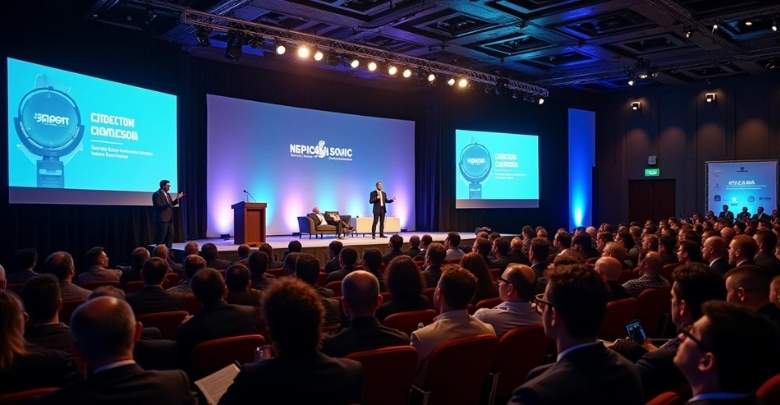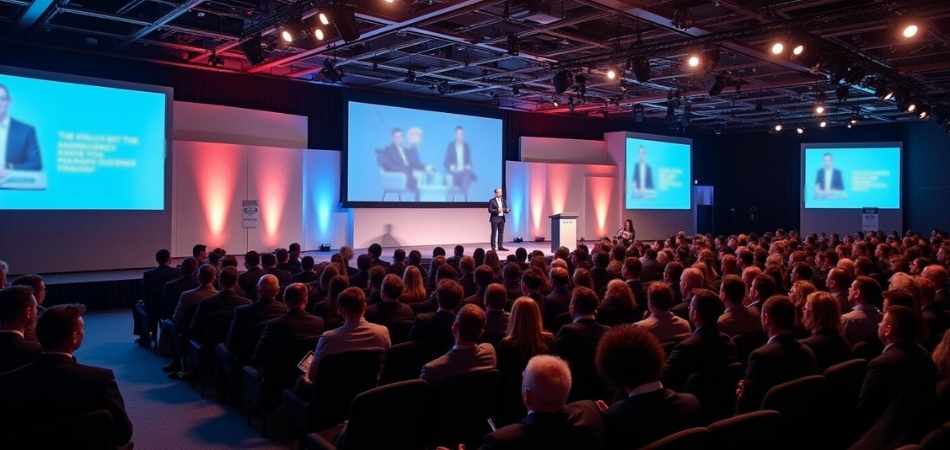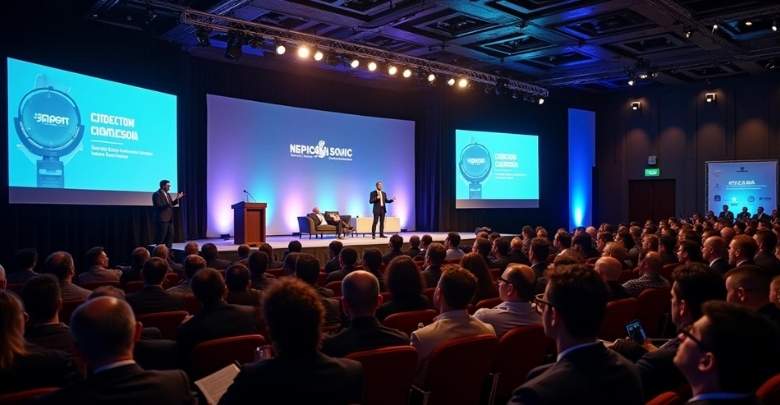The quality of a conference can significantly impact your professional development and networking opportunities. It’s crucial to ensure that the event you’re investing time and resources into meets your expectations of value and relevance. If you’re uncertain how to check the quality of conferences? Then you have come to the right place.
To check the quality of a conference, start by researching the organizers and their track record. Examine the list of speakers and their credentials, review the agenda for relevant and insightful topics, and look for feedback from previous attendees. These elements are indicators of the conference’s potential to offer meaningful and engaging experiences.
Are you curious about ensuring that a conference is worth your time? This article will guide you through detailed steps and criteria to assess any conference effectively. Take a look at how to make informed decisions about which conferences to attend and maximize your professional growth opportunities.
Why is It Important to Assess the Quality of Conferences?
Assessing the quality of conferences is crucial to ensure they provide meaningful opportunities for learning, collaboration, and professional growth. High-quality conferences feature well-respected speakers, credible research, and organized proceedings that contribute to advancing knowledge in their respective fields. Poor-quality events, on the other hand, risk wasting time, money, and effort while offering little to no value.

Evaluating conferences helps professionals identify which events align with their goals and offer a worthwhile experience. Reliable conferences often have transparent selection processes for presentations and papers, ensuring high academic and professional standards. Such assessments are particularly important for early-career researchers seeking credible platforms to present their work.
Conferences are held across the globe, including countries like Canada, the United States, and Europe, each offering unique benefits. For instance, conferences in Canada are known for promoting diverse and inclusive environments, attracting participants from various backgrounds, and providing excellent networking opportunities.
How to Check the Quality of Conferences?
Choosing the right conference can make a significant difference in your professional growth and networking opportunities. Knowing how to evaluate a conference’s quality ensures you invest your time and resources wisely. Here are key factors to assess.

Research the Organizers
The first step is to investigate the event organizers. Reputable organizations or well-known institutions often host high-quality conferences. Check their past events and the feedback received to ensure their credibility. A professional and transparent website with detailed information about the conference is usually a good sign. Reliable organizers set the foundation for a successful and well-managed event.
Evaluate the Speakers
The quality of speakers can reflect the credibility of the conference. Look for recognized experts, industry leaders, or respected academics listed on the agenda. Research their professional backgrounds and previous talks to ensure they align with your interests and goals. Conferences with a lineup of reputable speakers often provide valuable insights and high-impact discussions. Engaging speakers makes the event more enriching.
Examine the Agenda
A well-structured agenda is the hallmark of a successful conference. Review the session topics, timing, and format to determine if they are relevant and insightful. Workshops, panel discussions, and networking sessions add depth and variety to the schedule. If the agenda lacks detail or seems overly generic, it may indicate a poorly organized event. A thoughtful agenda serves diverse attendee needs and ensures a balanced experience.
Check Attendee Reviews and Testimonials
Past attendee feedback can provide honest insights into the quality of a conference. Look for reviews on social media, forums, or the conference’s website to gauge attendee satisfaction. Positive testimonials often highlight the event’s strengths, such as organization, content, and networking opportunities. Negative reviews, on the other hand, can help you identify potential drawbacks. Consistent feedback from attendees is a valuable indicator of the event’s credibility.
Verify Accreditation and Partnerships
High-quality conferences often have accreditations or partnerships with respected organizations. These affiliations can include universities, professional associations, or industry leaders. Accreditation ensures the conference meets certain standards of professionalism and relevance. Strong partnerships also increase the event’s prestige and resources, making it more impactful for attendees.
Assess the Venue and Location
The venue’s quality plays a significant role in the overall conference experience. Check whether the event is hosted in a professional and accessible location. A good venue typically offers advanced facilities, ample space, and a comfortable environment. Conferences held in well-known venues or business hubs are often better organized and attract a diverse range of participants.
Consider Networking Opportunities
Conferences are as much about networking as they are about learning. Evaluate whether the event includes dedicated opportunities to interact with speakers, exhibitors, and fellow attendees. Networking sessions, informal meetups, and discussion panels encourage meaningful connections. Events that prioritize networking often create lasting value for participants. Strong networking opportunities improve both personal and professional growth.
Look for Clear Registration Details
Transparent and well-organized registration is another sign of a credible conference. Check whether the process is simple, with clear pricing, deadlines, and available options. Conferences that offer early bird discounts or multiple payment methods often pay attention to attendee convenience. Confusing or poorly communicated registration processes may indicate underlying issues with the organization.
Analyze the Marketing and Communication
Professional conferences usually have clear and consistent communication across their marketing channels. Check the quality of their website, promotional materials, and social media presence. Poorly designed materials or unclear messaging can signal a lack of professionalism. Strong marketing efforts often indicate that the organizers are experienced and committed to delivering a high-quality event.
Consider the Balance Between Costs and Value
Assess whether the registration fees align with the value provided by the conference. High-quality events often charge more but deliver substantial benefits, such as access to renowned speakers, advanced facilities, and valuable networking opportunities. If the costs seem too low or too high compared to similar events, investigate further. A fair balance between cost and value is crucial for ensuring a worthwhile experience.
What Factors Define a High-Quality Conference?
A high-quality conference provides attendees with value through excellent organization, engaging content, and ample growth opportunities. Knowing about the factors that contribute to a great event ensures you make the most of your time and investment. Here’s what to look for.
Reputable Organizers and Partnerships
High-quality conferences are often hosted by reputable organizations or institutions with a track record of successful events. These organizers work with credible partners, such as industry leaders, universities, or professional associations, to ensure the event’s relevance and impact. Partnerships with well-known entities add to the event’s prestige and attract high-profile participants. Strong organizers also ensure continuous logistics, creating a professional and enjoyable experience for attendees.
Expert Speakers and Relevant Topics
The quality of the speakers and the relevance of the topics are key indicators of a conference’s value. High-caliber conferences feature well-known experts, thought leaders, and industry pioneers who provide deep insights and practical takeaways. A diverse lineup of speakers addressing current and pressing issues makes the event more engaging and impactful. Attendees leave with actionable knowledge and a clearer perspective of industry trends.
Thoughtful Agenda and Structure
A well-structured agenda is essential for a high-quality conference. The schedule should balance keynote speeches, panel discussions, workshops, and networking opportunities. This variety meets different attendee needs and ensures active participation throughout the event. A thoughtfully planned agenda also allows for breaks, giving participants time to process information and recharge. A clear and extensive agenda reflects the organizers’ commitment to delivering a meaningful experience.
Opportunities for Networking and Collaboration
Networking is a crucial aspect of any high-quality conference. The event should provide structured and informal opportunities for attendees to connect, collaborate, and build relationships. Networking lounges, meet-and-greet sessions, and social events are common features of well-organized conferences. These elements encourage meaningful exchanges and create lasting professional connections, enhancing the overall value of the event.
High-Quality Venue and Facilities
The venue plays a significant role in defining a conference’s quality. A high-standard conference takes place in a well-equipped, accessible, and comfortable location that supports all planned activities. Features like modern audio-visual equipment, ample space, and thoughtful design contribute to the experience. The right venue also accommodates the expected number of attendees without overcrowding, ensuring everyone can participate comfortably.
Transparent Communication and Registration
Effective communication is an essential component of a high-quality conference. Organizers should provide clear information about registration fees, deadlines, and processes on the event’s website or promotional materials. Transparency in costs and benefits helps attendees make informed decisions. Additionally, a smooth and efficient registration process reflects the organizers’ professionalism and attention to detail.
Positive Feedback and Consistency
A high-quality conference often has a history of positive reviews and satisfied attendees. Consistency in delivering value and maintaining standards over multiple editions builds trust and credibility. Checking feedback from previous attendees provides insights into the event’s strengths and areas of improvement. Positive testimonials highlight what makes the conference stand out and why it’s worth attending.
Assessment of Networking Opportunities at a Conference
The networking experience is an essential part of any successful conference, providing invaluable connections and opportunities for growth. Analyzing a conference’s networking potential ensures you make the most of your time and leave with meaningful professional relationships. Here’s how to assess networking opportunities effectively.
Review the Event’s Agenda
A well-planned agenda often includes dedicated networking sessions. Check if the conference offers workshops, roundtables, or informal meetups designed to encourage interaction. Events that prioritize networking will allocate sufficient time for participants to connect outside of formal sessions. In Canadian conferences, these opportunities often highlight the diverse expertise and perspectives of attendees.
Examine the Attendee Demographics
Knowing who is likely to attend the conference helps you determine the relevance of networking opportunities. Look for information about participant industries, roles, and expertise shared on the event website or promotional materials. Conferences with diverse or high-profile attendees provide better chances for impactful connections. For example, Canadian industry events often attract professionals from various sectors, enhancing the value of networking sessions.
Assess the Conference Format
The structure of a conference plays a vital role in developing networking opportunities. Formats that promote interaction, such as panel discussions or Q&A sessions, enable attendees to actively participate and exchange ideas. Larger events often include dedicated networking lounges or matchmaking tools to connect individuals with similar interests. Utilizing these features can help create meaningful connections and better the overall experience.
Check for Organized Networking Activities
High-quality conferences often include structured networking activities, such as speed networking, icebreaker sessions, or themed social events. These initiatives promote a more inclusive environment, making it easier for attendees to connect and network effectively at a Canadian industry conference. In Canada, events often combine professional networking with cultural experiences, offering an excellent opportunity to build meaningful connections. Organized activities play a key role in introducing people and facilitating valuable relationships.
Review the Online Networking Options
Many conferences incorporate online networking platforms. Check if the event offers virtual meetups, dedicated networking apps, or attendee directories. These tools can be particularly useful for connecting with participants before, during, and after the event. Online options extend the reach of networking opportunities, ensuring continued engagement beyond the conference.
How to Assess the Conference Format and Structure?
Assessing a conference’s format and structure is essential to ensure it aligns with your goals and provides a valuable experience. A well-organized event maximizes opportunities for learning, networking, and collaboration. Here are key factors to consider when evaluating conference formats.
Analyze the Agenda for Balance
The agenda serves as the foundation of any conference, showcasing the planned sessions and activities. A high-quality conference features a balance of keynotes, panel discussions, workshops, and networking events. This variety ensures that attendees can engage in different formats suited to their learning styles. Authentic stats from event studies show that conferences with diverse agendas report 25% higher attendee satisfaction, emphasizing the importance of well-structured schedules.
Evaluate Session Formats and Engagement
The types of sessions offered at a conference can significantly impact your experience. Interactive formats such as Q&A panels, breakout sessions, or roundtable discussions encourage active participation and idea sharing. Meanwhile, keynote presentations and lectures provide high-level insights from industry leaders. A mix of formats ensures that participants benefit from both in-depth learning and dynamic interactions. Assessing session details helps identify opportunities for engagement and hands-on experiences.
Check Networking Opportunities
A great conference structure integrates dedicated time and spaces for networking. Look for scheduled activities like coffee breaks, receptions, or networking lounges. Conferences that offer interactive tools such as event apps or attendee directories provide additional avenues for connecting with peers. Statistics indicate that 85% of attendees consider networking a critical factor when choosing a conference, making this a key aspect of the format.
Assess Timing and Breaks
Effective time management within a conference schedule improves the attendee experience. Review how much time is allocated to sessions, breaks, and transitions between activities. A well-paced schedule avoids overwhelming participants while ensuring they stay engaged. Breaks provide time to reflect, recharge, and connect informally, contributing to a productive and enjoyable event.
Consider the Venue’s Role
The venue directly impacts how the conference format is executed. A spacious, well-equipped venue allows for diverse activities, including exhibitions, workshops, and interactive sessions. Smaller venues may focus on creating intimate, collaborative environments. Considering how the venue supports the planned format helps you understand the event’s scope and logistics.
The venue directly impacts how the conference format is executed. A spacious, well-equipped venue allows for diverse activities. If you are someone planning to participate in a Canadian conference, consider the typical conference size in Canada at your selected conference venue and also assess the format of the event for maximum possibilities.
Tips for Making the Most of a High-Quality Conference
Attending a high-quality conference can be a transformative experience if approached strategically. With careful planning and active participation, you can maximize its value. Here are practical tips to help you get the most out of your conference experience.
Set Clear Goals Before Attending
Define what you want to achieve from the conference, whether it’s networking, gaining knowledge, or discovering new trends. Having specific objectives helps you prioritize sessions, workshops, and people to connect with. Adjusting your focus ensures your time and energy are well-spent. Clear goals also provide a framework for considering the event’s impact after it concludes.
Research the Agenda and Speakers
Review the conference agenda and highlight sessions that align with your interests or career goals. Familiarize yourself with the speakers and their expertise, so you can prepare relevant questions or topics for discussion. Knowing the schedule in advance allows you to plan effectively and avoid missing crucial opportunities. This preparation upgrades your engagement and overall experience.
Engage Actively in Sessions
During sessions, take detailed notes, ask thoughtful questions, and participate in discussions whenever possible. Active engagement helps you retain more information and makes you memorable to speakers and peers. It’s also an excellent way to clarify points and gain deeper insights into complex topics. Staying engaged demonstrates your commitment to learning and growing.
Network Strategically
Take advantage of networking opportunities by introducing yourself to speakers, panelists, and fellow attendees. Use informal settings like coffee breaks and social events to connect with people who share your interests. Bringing business cards or a digital contact method ensures uninterrupted exchanges of information. Strategic networking can lead to valuable professional relationships and collaborations.
Take Advantage of Conference Technology
Many high-quality conferences use apps or online platforms for schedules, networking, and event updates. Use these tools to stay informed about session changes, message other attendees, or participate in interactive polls. Conference technology refines your ability to make connections and explore the event efficiently. Staying active on these platforms also increases your visibility among participants.
Prepare for Follow-Up Connections
Post-conference follow-ups are key to building lasting relationships with the people you meet. Send personalized emails or LinkedIn messages to express your appreciation for their time or insights. Discuss potential collaborations or ideas you explored during the conference. Consistent follow-up solidifies your connections and keeps the dialogue open for future opportunities.
Reflect and Apply What You Learn
After the conference, review your notes and identify actionable takeaways or ideas. Share key insights with your team or network to reinforce your learning and spread its impact. Implementing what you’ve learned ensures the knowledge translates into meaningful outcomes. Reflecting on your experience also helps you determine how to improve your approach for future conferences.
Frequently Asked Questions (FAQs)
A professional conference’s vast landscape can seem daunting at first. To ensure you attend the best possible events that align with your career goals, here are some frequently asked questions about assessing the quality of conferences.
What Are Some Red Flags to Watch Out For When Considering a Conference?
Be cautious of conferences that lack detailed agendas or have unclear speaker information. Other red flags include a lack of previous attendee testimonials, poorly organized websites, and events that do not mention any reputable organizations as partners. These can indicate a lack of professionalism or experience in hosting effective events.
How Important Is the Conference Location in Determining Its Quality?
While the quality of content and speakers is crucial, the location can also play a significant role. A central, accessible location in a reputable venue often indicates a well-planned event. It should be easy to reach and provide necessary amenities, enhancing the overall attendee experience.
Can Social Media Provide Insights Into a Conference’s Quality?
Yes, social media can be a valuable tool for gauging a conference’s reputation. Look for discussions about the conference on platforms like LinkedIn, Twitter, or industry-specific forums. Comments and posts from past attendees can provide real-time feedback and insights into the event’s organization and value.
Why Is It Important to Review the Conference’s Cancellation Policy?
Checking the cancellation policy is crucial, especially for high-cost conferences. A clear, fair cancellation policy protects your investment if you can no longer attend. It also reflects the organizer’s professionalism and consideration of attendees’ circumstances, contributing to the overall trustworthiness of the event.
How Does the Diversity of Speakers and Topics Affect Conference Quality?
Diverse speakers and topics enrich the conference experience by providing a wide range of perspectives and expertise. High-quality conferences often feature a balanced lineup that covers various aspects of an industry. This diversity ensures complete coverage of current trends and challenges, offering greater learning opportunities.
Final Thought
Quality conferences are more than ensuring that you receive good value; they maximize your potential for professional growth and connection. Conferences that meet your needs can have profound effects on your career.
The process of how to check the quality of conferences involves a combination of research into the event’s organization, speaker lineup, and participant reviews. These factors help determine whether the conference will provide a stimulating environment conducive to learning and networking.
As you prepare to select your next conference, remember to carefully evaluate each opportunity. Check the organizer’s history, assess the session formats, and consider the networking possibilities. Best wishes as you find conferences that enrich your professional life and expand your horizons!







